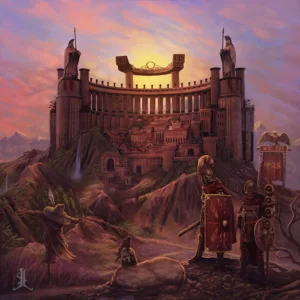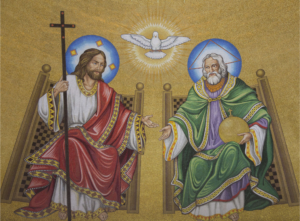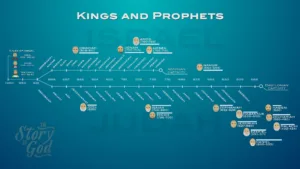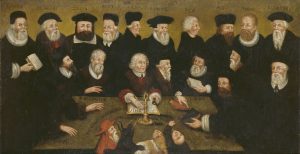The Kingdom of God
This is where the story gets very dramatically nuanced. We begin to see the Kingdom aspect of the incarnation of God as — King Jesus Christ.
Jesus ascended to the throne of David. The OT prophesied it. It was per the monarchial succession model of Ancient Israel’s kings.
There was a courtly pattern in the OT followed by the kings who succeeded to the throne. It was a tripartite model. And, encompassed in the following pattern of succession:
- Designation – anointing by God’s prophet or some form of calling out.
- Demonstration of fitness – a challenge to establish worthiness to rule.
- Coronation – receiving the crown, taking the throne.
Since Jesus ascended to the throne of David, I will give you the pattern in David’s succession and leave it at that. I may take this to a deeper level in the future. For now, I’ll give you a flyover.
The Pattern of David
Since Jesus succeeded to the throne of David, I will establish the pattern via David’s succession example.
David’s Designation
And he sent and brought him in. Now he was ruddy and had beautiful eyes and was handsome. And the LORD said, “Arise, anoint him, for this is he.” Then Samuel took the horn of oil and anointed him in the midst of his brothers. And the Spirit of the LORD rushed upon David from that day forward. And Samuel rose up and went to Ramah. (1 Sam 16:12-13)
David’s Demonstration of Fitness
And there came out from the camp of the Philistines a champion named Goliath of Gath, whose height was six cubits and a span. He had a helmet of bronze on his head, and he was armed with a coat of mail, and the weight of the coat was five thousand shekels of bronze. And he had bronze armor on his legs, and a javelin of bronze slung between his shoulders. The shaft of his spear was like a weaver’s beam, and his spear’s head weighed six hundred shekels of iron. And his shield-bearer went before him ….
But David said to Saul, “Your servant used to keep sheep for his father. And when there came a lion, or a bear, and took a lamb from the flock, I went after him and struck him and delivered it out of his mouth. And if he arose against me, I caught him by his beard and struck him and killed him. Your servant has struck down both lions and bears, and this uncircumcised Philistine shall be like one of them, for he has defied the armies of the living God.” And David said, “The LORD who delivered me from the paw of the lion and from the paw of the bear will deliver me from the hand of this Philistine.” And Saul said to David, “Go, and the LORD be with you! …
When the Philistine arose and came and drew near to meet David, David ran quickly toward the battle line to meet the Philistine. And David put his hand in his bag and took out a stone and slung it and struck the Philistine on his forehead. The stone sank into his forehead, and he fell on his face to the ground. (1 Sam 17:4-7, 34-37, 48-49)
David continued throughout the reign of Saul to show himself fit to be King of Israel and he allowed Yahweh to consummate the deal on his own time.
David’s Coronation
David’s coronation is a bit veiled in scripture. He was coronated as King of Judah while Ish-Bosheth, Saul’s son was alive and was coronated King over all of Israel upon the assassination of Ish-Bosheth when Abner delivered the entire nation to him.
Then all the tribes of Israel came to David at Hebron and said, “Behold, we are your bone and flesh. In times past, when Saul was king over us, it was you who led out and brought in Israel. And the LORD said to you, ‘You shall be shepherd of my people Israel, and you shall be prince over Israel.’” So all the elders of Israel came to the king at Hebron, and King David made a covenant with them at Hebron before the LORD, and they anointed David king over Israel. David was thirty years old when he began to reign, and he reigned forty years. At Hebron he reigned over Judah seven years and six months, and at Jerusalem he reigned over all Israel and Judah thirty-three years. (2 Sam 5:1-5)
Jesus’ Succession
Jesus went through the same succession sequence with different details during his incarnation.
Jesus’ Designation
Jesus called John the Baptist the greatest man born to women (Matt 11:11). God chose him to be the one to announce (designate) the ministry of Jesus. He was the coming of the Kingdom of God and was the King.
As it is written in the book of the words of Isaiah the prophet, “The voice of one crying in the wilderness: ‘Prepare the way of the Lord, make his paths straight.’” (Luk 3: 4)
And it happened that in those days Jesus came from Nazareth in Galilee and was baptized in the Jordan by John. And immediately as he was coming up out of the water, he saw the heavens being split apart and the Spirit descending like a dove on him. And a voice came from heaven, “You are my beloved Son; with you I am well pleased.” (Mark 1:9-11, Lexham English Bible)
Take a look at this extended breakout of the passage. It is very exciting and enriching.
There are two items in this passage whose importance is not conveyed in English translation.
First, Mark’s note that the heavens were “split apart” is significant. The Greek lemma is schizo. Mark’s choice of the term in connection with the water baptism of Jesus has drawn the attention of scholars because of the use of schizo in the Septuagint, the Greek translation of the Old Testament used by Jesus and the apostles. Not coincidentally, schizo is the verb used in Exodus 14: 21 to describe the miraculous parting of the sea.
Think back to our discussion of the exodus event. The deliverance from Egypt was a victory over hostile gods. In Exodus 15: 11 Moses asked the rhetorical question, “Who is like Yahweh among the gods?” The answer was obvious: no one. The exodus event was a release from exile. Yahweh brought his people out of Egypt to reconstitute them as a nation and re-establish his Edenic kingdom rule on earth.
Mark wants readers to see that a new exodus event is happening. The kingdom of God is back, and this time it will not fail because the visible Yahweh is leading it, now incarnate as Jesus of Nazareth. The imagery is even more startling when we factor in Jude 5, a passage we looked at earlier in this chapter. Jude has Jesus leading a people out of Egypt. The reference was to the visible Angel, who was Yahweh in human form, who brought Israel out of Egypt into the promised land (Judg 2: 1– 2; cf. Exod 23: 20– 23).
Second, Mark 1: 11 has God’s voice from heaven pronouncing, “You are my beloved Son; with you I am well pleased.” We tend to think of this declaration as a sentimental one, or perhaps some verbal token of affection. It is far more than that. When God refers to Jesus as his “beloved” he is affirming the kingship of Jesus— his legitimate status as the heir to David’s throne. The key term is “beloved.” Scholars have noticed that the term was used of Solomon, the original heir to David’s throne. It is difficult to discern that in English translation, though, since the Hebrew term gets translated as a proper name: Jedidiah. Solomon is referred to as “Jedidiah” in 2 Samuel 12: 24– 25
The New Testament story, then, begins with a dramatic revisitation of Yahweh’s call to the divine council to send someone to announce the appearance of Yahweh in the man Jesus of Nazareth. That much will become evident to friend and foe, human and divine. The strategy behind the appearance of the king, however, is cloaked. It had been over five hundred years since the return of Judah from exile. The emergence of Jesus, born and raised in obscurity, from the water launches a battle of wits that entangles both the divine and the human realms. [iii] (Emphasis mine)
Jesus’ Demonstration of Fitness
I am not going to continue to drill down on the entire ministry of Jesus. You have the New Testament for the full picture of that. I will only cover the highlights that show how warfare relates to the incarnation.
The entire ministry of Jesus satisfied the challenge to show his fitness to rule. It began immediately after the baptism of Jesus. The Holy Spirit led him into the wilderness to face down Satan. Satan had an inkling of what was happening, but I do not think he had any idea of the scope of trouble he was in. Jesus met challenges in the three areas common to man:
- Lust of the flesh (physical deprivation),
- Pride of life (trying to manipulate God),
- Lust of the eyes (temptation toward immense wealth/power). (See Matt 4:1-10)
As soon as Jesus came out of the wilderness experience John the Baptist got arrested by Herod. Then his ministry began in earnest.
Now after John was arrested, Jesus came into Galilee, proclaiming the gospel of God, and saying, “The time is fulfilled, and the kingdom of God is at hand; repent and believe in the gospel.” (Mark 1:14-15)
Jesus presented the Kingdom of God to the people of Israel. Their messiah had come. It was a new chapter in the story of the nation. John, sitting in prison, was only hearing some of the stories. He knew he was going to get executed. He sought confirmation that he had fulfilled his role as prophet. He sent some of his disciples to ask the question of Jesus, “Are you the one …?”
And he answered them, “Go and tell John what you have seen and heard: the blind receive their sight, the lame walk, lepers are cleansed, and the deaf hear, the dead are raised up, the poor have good news preached to them. And blessed is the one who is not offended by me.” (Luk 7:22-23)
The Kingdom of God was at hand. Jesus confirmed it to the Pharisees.
The Law and the Prophets were until John; since then, the good news of the kingdom of God is preached, and everyone forces his way into it. (Luk 16:16)
And it was good news. There was liberation happening in a more significant way than the Exodus. Miracles were happening everywhere Jesus went. For example, we see the instance of Jesus releasing a man from demon possession.
And crying out with a loud voice, he said, “What have you to do with me, Jesus, Son of the Most High God? I adjure you by God, do not torment me.” For he was saying to him, “Come out of the man, you unclean spirit!” And Jesus asked him, “What is your name?” He replied, “My name is Legion, for we are many.” … And the unclean spirits came out and entered the pigs; and the herd, numbering about two thousand, rushed down the steep bank into the sea and drowned in the sea. (Mark 5:8-13)
People were being healed of various diseases.
And there was a woman who had had a discharge of blood for twelve years, and though she had spent all her living on physicians, she could not be healed by anyone. … And he said to her, “Daughter, your faith has made you well; go in peace.” (Luk 8:43-48)
People were being forgiven of their sins, which put a twist in the panties of the Pharisees. They were uneasy that he went around healing people. But they hated, with a passion, that he forgave sins because that was the realm of God.
When Jesus perceived their thoughts, he answered them, “Why do you question in your hearts? Which is easier, to say, ‘Your sins are forgiven you,’ or to say, ‘Rise and walk’? But that you may know that the Son of Man has authority on earth to forgive sins”—he said to the man who was paralyzed— “I say to you, rise, pick up your bed and go home.” And immediately he rose up before them and picked up what he had been lying on and went home, glorifying God. (Luk 5:22-25)
I could go on demonstrating that Jesus was the message of the gospel personified. He came to redeem and release. But the Bible does that so much better than I do. I will leave the heavy lifting to the Bible.
Jesus’ Coronation – Calvary
The victories of God are confusing and counterintuitive to the natural man. The cross of Christ is the most resounding victory ever recorded. The natural man scoffs at what he sees as foolishness.
The natural man sees the death of Jesus and sees defeat but that is the way God intended it to take place. In truth, it was the final phase of his incarnation and the crowning of Christ as King. Calvary is Jesus’ coronation. Let’s look at why we can say this with confidence.
Jesus was sent to trial before the religious establishment of the Jews.
But he remained silent and made no answer. Again the high priest asked him, “Are you the Christ, the Son of the Blessed?” And Jesus said, “I am, and you will see the Son of Man seated at the right hand of Power, and coming with the clouds of heaven.” And the high priest tore his garments and said, “What further witnesses do we need? You have heard his blasphemy. What is your decision?” And they all condemned him as deserving death. (Mark 14:61-64)
Though as a parody, they clothed him as a King and bowed down to worship him.
And they clothed him in a purple cloak, and twisting together a crown of thorns, they put it on him. And they began to salute him, “Hail, King of the Jews!” (Mark 15:17-18)
In the first 32 verses of Mark 15, by parody, or leading question, or signage, The Bible declares him King of the Jews 6 times.
- Three times by Pilate, vs 2, vs 9, and vs 12
- Twice by mockers, before and after the cross, vs 18 and vs 32
- Once by the sign over his cross, vs 26
In Luke 23:26-32, we can see a parody of a royal retinue. Jesus had a following in his coronation march to Golgotha:
- There was Simon of Cyrene, carrying his cross behind him.
- The two robbers got crucified with him, one on his right and one on his left.
Yes, it is a parody and sarcastic satire. You can be skeptical because of that, but that is the wrong way to look at it.
He was ridiculed because he did not save himself. Rather he died as the substitutionary sacrifice. He completed his succession to the throne. He is worthy.
The Cross of Christ was a huge and masterful feint on the part of Yahweh. He completely took his enemies by surprise. He accomplished his purpose for creation. He never abandoned his plans. He adjusted along the way. The adjustments were both foreknown and fore planned from eternity past.
No one saw this coming because Yahweh didn’t want them to connect the dots. If they had they would have foiled the plan if they could.
Yet among the mature we do impart wisdom, although it is not a wisdom of this age or of the rulers of this age, who are doomed to pass away. But we impart a secret and hidden wisdom of God, which God decreed before the ages for our glory. None of the rulers of this age understood this, for if they had, they would not have crucified the Lord of Glory. (1 Cor 2:6-8 emphasis mine)
Before you cry, “Foul!”, let me say this. I have not just done away with a physical coronation in a future millennial reign. This post is not about that. Keep in mind that prophecy sometimes gets fulfilled in stages. We cannot deny that in some sense Jesus is ruling now from heaven.
looking to Jesus, the founder and perfecter of our faith, who for the joy that was set before him endured the cross, despising the shame, and is seated at the right hand of the throne of God. (Heb 12:2)









